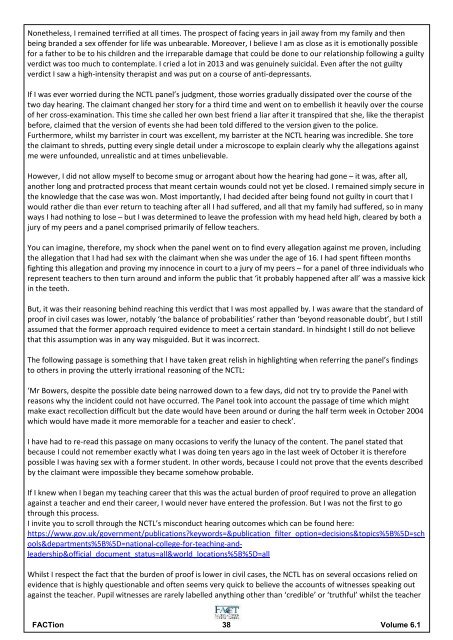FACTion-6.1-web-version
FACTion-6.1-web-version
FACTion-6.1-web-version
Create successful ePaper yourself
Turn your PDF publications into a flip-book with our unique Google optimized e-Paper software.
Nonetheless, I remained terrified at all times. The prospect of facing years in jail away from my family and thenbeing branded a sex offender for life was unbearable. Moreover, I believe I am as close as it is emotionally possiblefor a father to be to his children and the irreparable damage that could be done to our relationship following a guiltyverdict was too much to contemplate. I cried a lot in 2013 and was genuinely suicidal. Even after the not guiltyverdict I saw a high-intensity therapist and was put on a course of anti-depressants.If I was ever worried during the NCTL panel’s judgment, those worries gradually dissipated over the course of thetwo day hearing. The claimant changed her story for a third time and went on to embellish it heavily over the courseof her cross-examination. This time she called her own best friend a liar after it transpired that she, like the therapistbefore, claimed that the <strong>version</strong> of events she had been told differed to the <strong>version</strong> given to the police.Furthermore, whilst my barrister in court was excellent, my barrister at the NCTL hearing was incredible. She torethe claimant to shreds, putting every single detail under a microscope to explain clearly why the allegations againstme were unfounded, unrealistic and at times unbelievable.However, I did not allow myself to become smug or arrogant about how the hearing had gone – it was, after all,another long and protracted process that meant certain wounds could not yet be closed. I remained simply secure inthe knowledge that the case was won. Most importantly, I had decided after being found not guilty in court that Iwould rather die than ever return to teaching after all I had suffered, and all that my family had suffered, so in manyways I had nothing to lose – but I was determined to leave the profession with my head held high, cleared by both ajury of my peers and a panel comprised primarily of fellow teachers.You can imagine, therefore, my shock when the panel went on to find every allegation against me proven, includingthe allegation that I had had sex with the claimant when she was under the age of 16. I had spent fifteen monthsfighting this allegation and proving my innocence in court to a jury of my peers – for a panel of three individuals whorepresent teachers to then turn around and inform the public that ‘it probably happened after all’ was a massive kickin the teeth.But, it was their reasoning behind reaching this verdict that I was most appalled by. I was aware that the standard ofproof in civil cases was lower, notably ‘the balance of probabilities’ rather than ‘beyond reasonable doubt’, but I stillassumed that the former approach required evidence to meet a certain standard. In hindsight I still do not believethat this assumption was in any way misguided. But it was incorrect.The following passage is something that I have taken great relish in highlighting when referring the panel’s findingsto others in proving the utterly irrational reasoning of the NCTL:‘Mr Bowers, despite the possible date being narrowed down to a few days, did not try to provide the Panel withreasons why the incident could not have occurred. The Panel took into account the passage of time which mightmake exact recollection difficult but the date would have been around or during the half term week in October 2004which would have made it more memorable for a teacher and easier to check’.I have had to re-read this passage on many occasions to verify the lunacy of the content. The panel stated thatbecause I could not remember exactly what I was doing ten years ago in the last week of October it is thereforepossible I was having sex with a former student. In other words, because I could not prove that the events describedby the claimant were impossible they became somehow probable.If I knew when I began my teaching career that this was the actual burden of proof required to prove an allegationagainst a teacher and end their career, I would never have entered the profession. But I was not the first to gothrough this process.I invite you to scroll through the NCTL’s misconduct hearing outcomes which can be found here:https://www.gov.uk/government/publications?keywords=&publication_filter_option=decisions&topics%5B%5D=schools&departments%5B%5D=national-college-for-teaching-andleadership&official_document_status=all&world_locations%5B%5D=allWhilst I respect the fact that the burden of proof is lower in civil cases, the NCTL has on several occasions relied onevidence that is highly questionable and often seems very quick to believe the accounts of witnesses speaking outagainst the teacher. Pupil witnesses are rarely labelled anything other than ‘credible’ or ‘truthful’ whilst the teacher<strong>FACTion</strong> 38 Volume <strong>6.1</strong>


